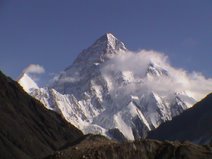 Tuesday, August 02, 2005
Tuesday, August 02, 2005
DR SYED FAROOQ HASNAT
In June and July the American troops and the Afghan government functionaries came under a series of armed attacks, shattering the comparative calm in Afghanistan. These vicious and daring assaults indicate that the much awaited parliamentary elections in September will not be free from trouble, and that the menace of Taliban still exists, as a potential future challenge. Contrary to what was the forecast in the past, these assaults specify that the war against terrorism in Afghanistan is far from over. The latest resistance inflicted a number of causalities on the American troops, raising the total of dead to 150, since 2001. There are nearly 15,000 U.S. troops in Afghanistan, with an additional battalion poised for that war torn country.
The heavy reliance on the American forces indicate the lack of organised Afghan security structure, i.e., even after more than four years of the elimination of the Taliban administration and the Afghan army remains far from adequately trained. President Hamid Karzai largely depends on the US commandos for his personnel security and his opponents taunt that he is just a Mayor of Kabul, as his authority does not extend beyond that city. Although Karzai is a Pashtun but his government is dominated by much detested and suspected Uzbeks and Tajiks, minorities. Afghanistan still remains ethnically subjected as well as a competitive society with blocks of authority in various ethnic regions of the country. The law and order in Afghanistan has always been far from satisfactory and the pace of development remains extremely slow. According to an opinion, “this remained an area where, unfortunately, the Karzai government and the International Security Assistance Force have failed to deliver, as security beyond Kabul is virtually non-existent.” In particular, the Zabul Province and the adjoining areas of Kandahar and Uruzgan Provinces have become strong holds of the militants. It is estimated that in these areas, the Taliban are much organised with no shortage of men, weapons and finances. The situation in Afghanistan is described by some as, “one of barely managed chaos”.
Before the attacks, it was estimated by the US sources and the Afghan government that insurgency had faded away and that the Taliban had lost their clout in the country. The main reason given was that last October, Presidential elections took place without hindrance and that during the winter of 2004-5, there was little or no activity from the Taliban. However, since April of this year 45 US military personnel were killed by the suspected Taliban, while hundreds of Afghan soldiers and civilians died in armed clashes. It was said that the Afghan militants were using the same tactics of attack as the Iraqi insurgents. These activities panicked the fragile Afghan government, as well it exposed its vulnerability.
Accompanied by the hype in militancy, came a volley of direct and indirect blames on Pakistan. Included, in that rhetoric was the statement of Afghan-American US Ambassador to Afghanistan, Zalmay Khalizad. He vehemently said that Mullah Omar and Osama bin Laden were somewhere in Pakistan. He however, could not substantiate his allegations with details and evidence. His claim that the militants have infiltrated from Pakistan, in an organised manner, was termed as baseless and irresponsible by Pakistan. Ambassador Khalizad’s charge was followed by statements by the Afghan government officials, the official controlled news media and President Karzai, himself. In Pakistan the reaction was sharp and forthcoming. Apart from a strong statement from government representative, terming these charges as irresponsible and without evidence, the un-official electronic and print media started to question the rationale of Pakistan’s complete commitment towards war against terrorism, in this part of the world. One of the leading Pakistani daily remarked, “It’s time Pakistan should rethink its policy of cooperating in the War on Terror and being rewarded only with slurs”.
The present crisis was defused with the intervention of President Bush, who persuaded both the countries to focus more on war against terrorism, than finding faults with each other. These developments further confirmed that bilateral ties between the two neighboring countries have become a matter of triangular relations, aggravating with the spread of global terrorism – becoming more problematic. Pak-Afghan relations remain a matter of serious concern for the US strategic planners, as long as militancy continues to dominate the region.
Pakistan maintains around 80,000 troops in the tribal and adjoining areas, with Afghanistan. The borders are completely sealed, with latest reconnaissance devices and the Taliban entering Afghanistan in an organised manner is inconceivable. The main weakness lies with the Afghan security apparatus itself. A glaring example is the escape of four Afghan prisoners from Bagram jail, a facility that is heavily guarded and is under the direct control of the American troops. The escape was not possible without the cooperation of the Afghan soldiers, on duty. Till now there has been no trace of the escapees, who were known for their hardened ideology and considered extremely dangerous. It is easier for the Afghan administration to blame Pakistan for their security lapses, as little efforts are made by Kabul administration to establish its control in areas that are beyond the city of Kabul. Apart from that the Pashtun population is kept alienated by the Tajik-Uzbak alliance in the government. All Taliban might be Pashtuns but all Pashtuns does not confer to the ideology of the Taliban. In the close knit tribal society of Afghanistan, it is difficult to make a clear distinction between the two. Sometimes it is deliberately done so, to keep the majority of the Pashtuns, who are more than 50 percent of the Afghan population, away from the mainstream politics.
Since the 1980s, Afghanistan is coupled with Pakistan in a number of ways. The basis being that no matter what happens in Afghanistan it has direct fallout on the Pakistani society, whether as a result of regional compulsions or so chosen by the Pakistani establishment. The flurry of attacks on the Afghan government troops and the American military deployments during these months raised many new questions. These were not only in regard to Afghanistan’s internal security but also relates to the fragile relations between the two neighboring countries. At least, as a part of a policy pronouncement, Kabul recognises that its security is closely allied with that of Pakistan. On the eve of Prime Minister Shaukat Aziz’s one day official visit to Kabul on July 24, these sentiments were reflected in Afghan Foreign Ministry statement saying that “friendly relations between Pakistan and Afghanistan were in the national interest of both countries and an essential component to promote stability in the region”. On several occasions, similar statements have also been made in the past. But, when pressures increases, the level of relations between the two countries come back to a naught.
The Afghan government continues to suspect Pakistan for being supportive of the militants in their country and in the present circumstances, there is little chance that Kabul could be convinced otherwise. The focal point of these relations remains around the conflict between Taliban and the Afghan security setup. Pakistan is dragged in the Afghan quandary, when it fails to manage the operations of Afghan related militant groups in its own society. Therefore, when it comes to Afghan militancy, the part of the problem comes from within Pakistan. Musharraf’s government is seen by many as ineffective. The General’s July 21 address to the nation vowed to eradicate militancy in Pakistan, but is regarded by observers as nothing more than his January 12, 2002 declaration to take charge of extremism and militancy in the country. The present “awakening” of Musharraf is attributed to July 7 London bombings, in which the suicide bombers were alleged to have visited a Pakistani madrassa.
On its part, the Afghan society always presents itself in a package, carrying with itself a variety of dynamics and variables, which most of the time is difficult to manage by normal means. The past experience shows that the Afghans have yet to learn, solving their conflicts and accommodating the other point of view while running the government affairs. They have no experience in the modern concepts of legislative bodies, political parties or a structured judicial system. Whatever little they have, is confined to Kabul. In sum, there does not exist a political culture on whose foundations a modern society could be constructed. More so, with the brain drain since 1979, that went on unabated, the Afghan society lacks an indigenous expertise to manage their country. Experience has proved that a divided Afghanistan, devoid of any functional institutions, is incapable of reaching any political solution. As a reaction, the Kabul administration starts looking for a scapegoat and Pakistan is invariably there to be singled out.
There is little hope that the forthcoming September parliamentary elections would provide a substantial betterment of the overall situation. Pakistan would continue to receive the fallout of the Afghan mismanagement, unless the government takes immediate strict measures to eradicate the Afghan linked militants. The noted aspect is that Pakistan has lost its creditability to perform any meaningful role in the divided and volatile Afghan society. Because of intense past interference in the Afghan factional conflict, Pakistan has conceded most of its neutral ground and is branded as an active partner in the existing militancy. In fact the Pakistani establishment is visualised as a major part of the problem. This view is also shared by some American officials, who regard Musharraf not doing enough to stop the recruitment of the Taliban cadres. After all, Ambassador Khalizad is nothing more than a mouthpiece of the Bush administration.
In the circumstances, it is required that Pakistan makes drastic adjustments in its Afghan related attitudes and put its own house in order. That would provide an opportunity to depart from its defective perceptions of the past and set the record straight. Pakistan has got another chance to amend its follies. It still has an opportunity to exit from the “Afghan muddle” that it had partly created for itself.





